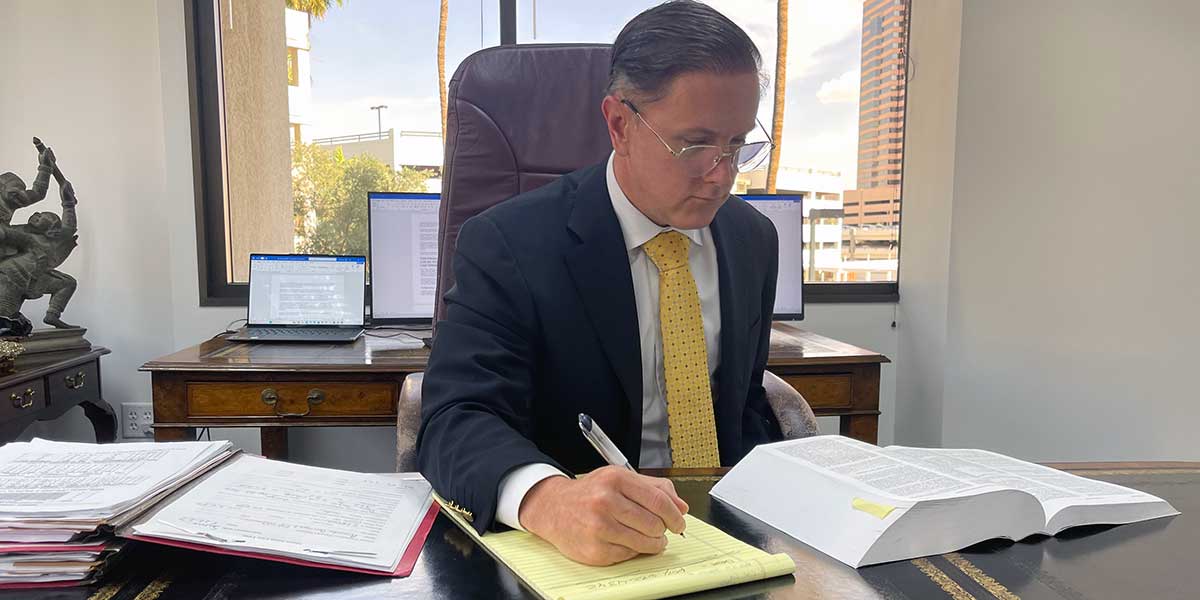Black Friday and Shoplifting Accusations

This article discusses the following:
- Black Friday Theft Statistics
- Understanding Shoplifting Charges in Arizona
- Legal Consequences of Shoplifting on Black Friday
- Defense Strategies for Shoplifting Accusations
- The Role of Surveillance and Witnesses in Shoplifting Cases
- What Happens When You Confess to Shoplifting
- How a Criminal Defense Attorney Can Help
At Kolsrud Law Offices, led by experienced attorney Josh Kolsrud, we specialize in providing legal defense to individuals accused of shoplifting, particularly during high-traffic events like Black Friday.
Shoplifting charges, governed by Arizona Revised Statutes (ARS §13-1805), can range from misdemeanors to felonies, depending on the value of the stolen items and the accused's criminal history.
According to the National Retail Federation, organized retail crime saw a significant increase in recent years, impacting businesses and leading to substantial financial losses. This period sees a heightened focus from law enforcement, with a 16% increase in shoplifting reports in major cities during high-traffic shopping times.

Black Friday Theft Statistics
Shoplifting, especially around the Black Friday period, is a significant concern for retailers, law enforcement, and the legal system.
Here are some statistics and insights related to shoplifting and Black Friday:
Organized Retail Crime Increase: In 2021, there was a notable increase in organized retail crime incidents compared to the previous year. This crime involves groups stealing merchandise on a large scale to resell, impacting businesses and costing companies an average of seven cents per $100 in sales."
Shoplifting Incidents in Major Cities: Analysis by the Council on Criminal Justice indicated that shoplifting reports in 24 major cities, including New York City, Los Angeles, Dallas, and San Francisco, were 16% higher during the first half of 2023 compared to 2019. However, excluding New York City, the number of incidents in the remaining cities was 7% lower.
Overall Shoplifting Cases in the U.S. According to FBI crime data, there were more than 548,000 shoplifting cases in 2021, accounting for nearly 20% of all reported theft/larceny crimes. It is estimated that there could be upwards of 26 million shoplifting incidents per year, considering that shoplifters are caught only in one out of every 49 instances."
Winter: Peak Season for Shoplifting: Reports indicate that about half of retailers’ annual losses due to shoplifting occur during the winter, with 81% of those incidents happening in the weeks leading up to the holiday season.
Contact us today to schedule a
FREE CONSULTATION and learn
how we can help you.
Understanding Shoplifting Charges in Arizona
Shoplifting in Arizona is defined as the unauthorized removal or concealment of merchandise from a retail establishment with the intent to deprive the store of its property without paying the full value.
This criminal offense can include acts such as taking an item, altering price tags, or transferring goods from one container to another with the purpose of avoiding full payment.
Understanding the legal definition of shoplifting is crucial for anyone facing such charges in Arizona, as it outlines the specific actions that constitute this offense under state law.
- Legal Definition and Interpretation:
-
- Shoplifting, as defined by the Arizona Revised Statutes (ARS), involves the unauthorized removal of goods from a retail establishment with the intent to deprive the store of its merchandise without paying the item's full value (ARS §13-1805).
- This definition extends beyond the simple act of taking an item; it includes altering price tags, transferring goods from one container to another, or any deceptive practice that results in underpaying for an item.
- Misdemeanor vs. Felony Shoplifting:
-
- In Arizona, the severity of a shoplifting charge largely depends on the value of the stolen goods and the defendant's prior criminal history.
- Shoplifting items valued at less than $1,000 is generally classified as a misdemeanor while stealing goods worth more than $1,000 can elevate the charge to a felony. There are exceptions, however, such as shoplifting a firearm, which is automatically treated as a felony regardless of the item's value.
- Relevant Arizona Revised Statutes:
-
- Key statutes include ARS §13-1805 (Shoplifting), ARS §13-1802 (Theft), and related sections that outline specific circumstances and penalties.
- These statutes provide a framework for understanding the legal boundaries of shoplifting and the potential charges that can arise from different scenarios.
Legal Consequences of Shoplifting on Black Friday
Shoplifting on Black Friday can bring about specific legal challenges and consequences. Given the increased foot traffic and heightened store surveillance during this period, accusations of shoplifting can be more common and the repercussions more severe.
Potential Penalties and Legal Repercussions:
-
- The penalties for shoplifting in Arizona vary depending on the value of the stolen items and the defendant's criminal history. Penalties can range from fines and community service for minor offenses to significant jail time for more severe cases.
- Felony charges, which are likely in cases involving higher-value goods or repeat offenses, can result in more severe penalties, including longer prison sentences and larger fines.
Black Friday Context:
-
- On Black Friday, stores are especially vigilant about shoplifting. This increased scrutiny can sometimes lead to wrongful accusations or misinterpretation of a shopper's actions.
- Conversely, the chaos and crowded conditions can also lead to more genuine cases of shoplifting, which might be prosecuted more aggressively due to the high-value items typically involved and the heightened attention on retail theft during this period.
Role of Criminal History:
-
- A defendant's prior criminal history plays a significant role in how shoplifting charges are handled and punished in Arizona. Repeat offenders are likely to face harsher penalties.
- For first-time offenders, especially in cases involving low-value items, there might be opportunities for more lenient sentencing, such as diversion programs or probation.
Defense Strategies for Shoplifting Accusations
When accused of shoplifting in Arizona, it's important to create a strong defense strategy that is specific to the details of the case.
This includes a careful review of the available evidence and a thorough understanding of the state's shoplifting laws. Several effective defense strategies can be used, each tailored to address the unique aspects of the individual case and the evidence presented.
Challenging the Accusation of Intent:
-
- One of the core elements of shoplifting is the intent to steal. If it can be demonstrated that the accused did not have the intention to steal (for example, it was an accidental oversight or a misunderstanding), this can be a powerful defense.
- Lack of intent can be shown through various means, such as demonstrating the accused's actions immediately before and after the alleged offense, their state of mind, or any relevant communication that occurred at the time.
Mistaken Identity and Wrongful Accusation:
-
- In the chaotic environment of Black Friday, mistaken identity can lead to wrongful accusations. Defense strategies may involve proving the accused was not present at the scene or that the identification by witnesses or surveillance footage is unreliable or unclear.
- This strategy might include presenting alibi evidence, scrutinizing the reliability of eyewitness testimony, and examining the quality and angle of surveillance footage.
Lack of Evidence or Faulty Evidence:
-
- A defense strategy might also focus on the insufficiency or inaccuracy of the evidence presented by the prosecution. This can include challenging how evidence was collected, stored, or presented.
- Questioning the chain of custody of the stolen item, the handling of surveillance footage, or the accuracy of inventory records can be part of this strategy.

The Role of Surveillance and Witnesses in Shoplifting Cases
In shoplifting cases, particularly during high-traffic events like Black Friday, surveillance footage and eyewitness testimony play pivotal roles. Understanding how these elements are used in the Arizona legal system can significantly impact the defense strategy in shoplifting cases.
- Impact of Video Surveillance:
- Surveillance footage is a common and influential form of evidence in shoplifting cases. It can provide a visual record of the events leading up to, during, and following an alleged shoplifting incident.
- However, the quality, angle, and coverage of surveillance footage can vary, potentially leading to misinterpretation or misidentification. Defense strategies may involve challenging the clarity or comprehensiveness of the footage.
- Eyewitness Testimony:
- Witness accounts from store employees, security personnel, or other shoppers can be compelling but are also subject to human error and bias. Defense can challenge the credibility of eyewitness testimony by questioning the witness's ability to accurately perceive and recall the event.
- The chaotic and crowded nature of Black Friday can further complicate eyewitness accounts, as heightened stress and confusion may affect a witness's observation and memory.
- Legal Considerations for Evidence:
- The way evidence is collected and presented in court is subject to strict legal standards. Defense strategies may include scrutinizing the procedures followed by law enforcement and store personnel in preserving and documenting evidence.
- In Arizona, as in other jurisdictions, the chain of custody for any evidence is crucial. Any lapses or irregularities in how evidence is handled can be grounds for challenging its admissibility or reliability in court.
- Challenging the Reliability of Evidence:
- The defense can argue against the reliability of surveillance footage and eyewitness testimony, especially considering the unique circumstances of Black Friday shopping. Factors such as crowd density, lighting, and the general commotion can all impact the accuracy of these types of evidence.
- Expert testimony might be used to highlight potential flaws in video surveillance technology or to cast doubt on the reliability of human memory under stress.
What Happens When You Confess to Shoplifting
Confessing to shoplifting, whether during the investigation stage or later in the legal process, significantly impacts the course of a case in Arizona. Understanding the legal implications of such a confession is crucial for anyone involved in a shoplifting incident.
Immediate Legal Implications
A confession to shoplifting in Arizona holds substantial weight in legal proceedings. It often leads to a more direct case resolution, potentially avoiding a trial. However, the conditions under which the confession is made are crucial. The admissibility of the confession can be influenced by factors such as the manner of questioning and the individual's awareness of their rights.
Sentencing and Plea Bargains
Confessing can significantly influence the nature of sentencing and plea negotiations. For first-time offenders or minor incidents, it might lead to options like diversion programs or probation. However, the specifics of the case and the value of the stolen items play a critical role in determining the outcome.
Rights of the Defendant
It's essential for anyone considering a confession to be fully aware of their rights, including the right to legal counsel. Confessions made under duress or without a clear understanding of these rights can be challenged by a defense attorney, especially regarding their validity and the circumstances in which they were made.
Legal Advice and Counsel
Consulting with a criminal defense attorney before confessing is highly advisable. Legal professionals can offer guidance tailored to the case's specifics and negotiate to ensure any confession serves the client's best interests.
In summary, confessing to shoplifting in Arizona is a significant legal step that should be taken with a full understanding of its implications and preferably under the guidance of a knowledgeable attorney

How a Criminal Defense Attorney Can Help
With his extensive experience in Arizona and federal criminal law, Josh Kolsrud of Kolsrud Law Offices is uniquely positioned to assist those accused of shoplifting.
His background encompasses over 3,500 cases and more than 100 jury trials.
His experience as both a state and federal prosecutor allows him to approach cases with a comprehensive understanding of the law and a commitment to protecting his clients' rights.
For those seeking legal assistance, Kolsrud Law Offices can be contacted for a free initial consultation. You can reach them at 480-680-9769 or via email at Josh@KolsrudLawOffices.com.
An award-winning criminal defense attorney Since 2006
Why Choose Josh Kolsrud
With over 100 jury trials to his name, and years of experience as a state and federal prosecutor, Josh understands the law, the legal process, and your rights. Josh is also committed to representing every client with utmost integrity and dedication
Experience
Josh has prosecuted major crimes on the state and federal level, led a successful anti-human sex trafficking operation that saved lives, and argued before countless juries and justices for his clients
Expertise
Josh is an expert in both Arizona and federal criminal law, and is ready to put that expertise to work for you.
Dedication
As a prosecutor, Josh saw far too many defendants lose their livelihood due to poor representation. Josh will always give every client his complete attention and effort
Get a Free Initial Consultation:
Complete our form below to get a free case review.
or call us at (480) 999-9444.
